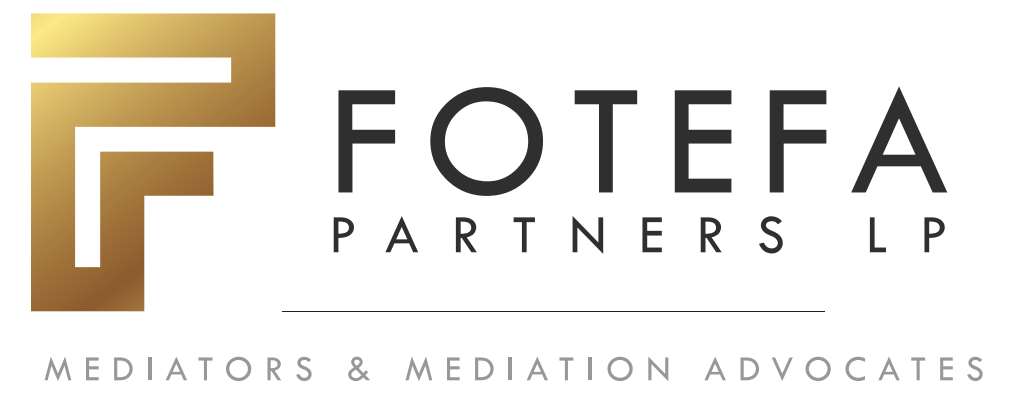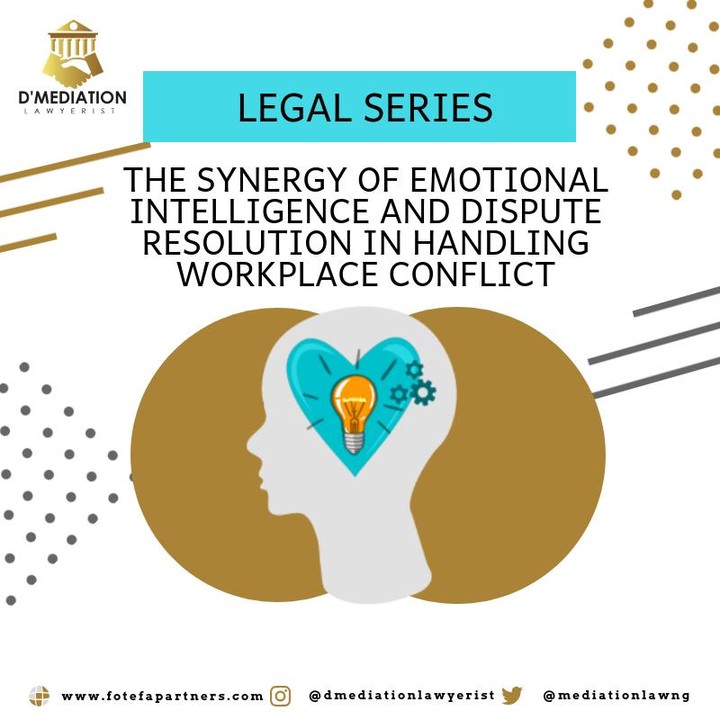Welcome to another Legal Series from D’Mediation Lawyerist!
Our topic this week is centered on helping employers and employees in resolving their internal and even external disputes as regards workplace conflict.
To start, we will be explaining some terms that many of us might have heard. First is, EMOTIONAL INTELLIGENCE; it is the capacity to be aware of, control, and express one’s emotions, and to handle interpersonal relationships judiciously and empathetically.
The next term is DISPUTE RESOLUTION a word which we may be more familiar with. It refers to a technique used to settle conflicts or claims between two parties, i.e. employer and employees. In this case, we’ll be using Emotional Intelligence.
Now to our main discussion, WORKPLACE CONFLICT or Organizational conflict is a state of discord caused by the actual or perceived opposition of needs, values and interests between people working together and it takes many forms in organizations. There are some facts that we need to bear in mind when it comes to workplace conflict and resolving it.
First is that conflict is inevitable, it is rooted in all parts of our human nature. It is important to be able to identify conflict in the workplace and know how to quickly and effectively resolve the underlying issues in a positive way.
Conflicts at work may take many forms. It might be an individual with a grievance, a problem between an employee and an employer or conflict between two co-workers. Any conflict can get in the way of work and make the business less productive.
Dealing with conflict at an early stage will save time, money and stress later on, for both the employer and employees and will stop the situation developing into a full-blown dispute.
Some of the issues that can cause conflict between individuals and groups at work include:
- Ineffective or insufficiently trained management
- unfair treatment
- unclear job roles, poor communication
- poor work environment
- lack of equal opportunities
- bullying and harassment
- unresolved problems from the past
- An increase in workload.
Compared to a few years ago, more disputes in the workplace are now being resolved through emotional intelligence and mediation. In fact, policy makers have encouraged this trend.
We will be highlighting the Benefits of using Emotional Intelligence in workplace conflicts. It includes
- Cutting the cost of conflict
- Diverting conflicts away from expensive adversarial procedures like court cases
- Getting working relationships back on line (where possible)
- Timelines and speed
- Enhancing communication
- Stimulating a healthy change and avoiding stagnation
- Fostering dignity at work
- Improving understanding of how to prevent costly conflict
- Enhancing people’s handling of their own disputes
The following are some of the qualities you must possess to effectively resolve workplace conflict.
**SELF-AWARENESS
This is having a clear perception of your personality including strengths, weaknesses, thoughts, beliefs, motivation, and emotions. Self-awareness allows you to understand other people, how they perceive you, your attitude and your responses to them at the moment. To become self-aware you need to first, Understand who you are, then, accept who you have been, and lastly, work towards who you want to be.
**EMOTIONAL INTELLIGENCE
This is about being assertive without being aggressive bearing in mind that; Assertiveness communicates the message while Aggressiveness communicates the pain.
**OBJECTIVITY AND SELF CONTROL
As a mediator, you must not become emotionally involved with the parties. You must have exceptional self-control to avoid the display of genuine anger, irritation, sympathy or weariness that may cause you to lose the initiative during questioning.
**ADAPTABILITY
You must be able to adapt to the many and varied personalities which you will encounter in the workplace.
**PERSEVERANCE
An individual who becomes easily discouraged by opposition, non-cooperation, and other difficulties, will not aggressively pursue the matter to a successful conclusion or exploit leads to other valuable information
**COMPETENCE
Your disposition must reflect fairness, strength, and efficiency, the party may prove more cooperative and more receptive to questions when they are aware of your neutrality and professionalism.
We have now come to the conclusion of our Legal series on emotional intelligence and it’s usefulness in resolving workplace disputes.
Perhaps most importantly, is the point, that when mediating one must not take sides, or be seen to be acting unfairly. You will therefore need to acknowledge points made by both parties, and spend equal time with each person on their issues. It’s never going to help to point out that someone is being unreasonable, but you can help them take a ‘reality check’ by asking what they would consider a reasonable outcome, and then asking whether they think the other party would agree.
In conclusion, the capacity to resolve workplace disputes effectively contributes to the quality of the working environment and has a significant impact on organizational performance in terms of reducing days lost, enhancing productivity and improving management-employee relations.
From the foregoing, it is clear that managing conflict effectively is not about stopping it or dampening it; It is about working to turn the energy normally put into negative use into the positive.
Thank you all for staying tuned to our series, feel free to share your thoughts and contributions to this discussion. Cheers!


